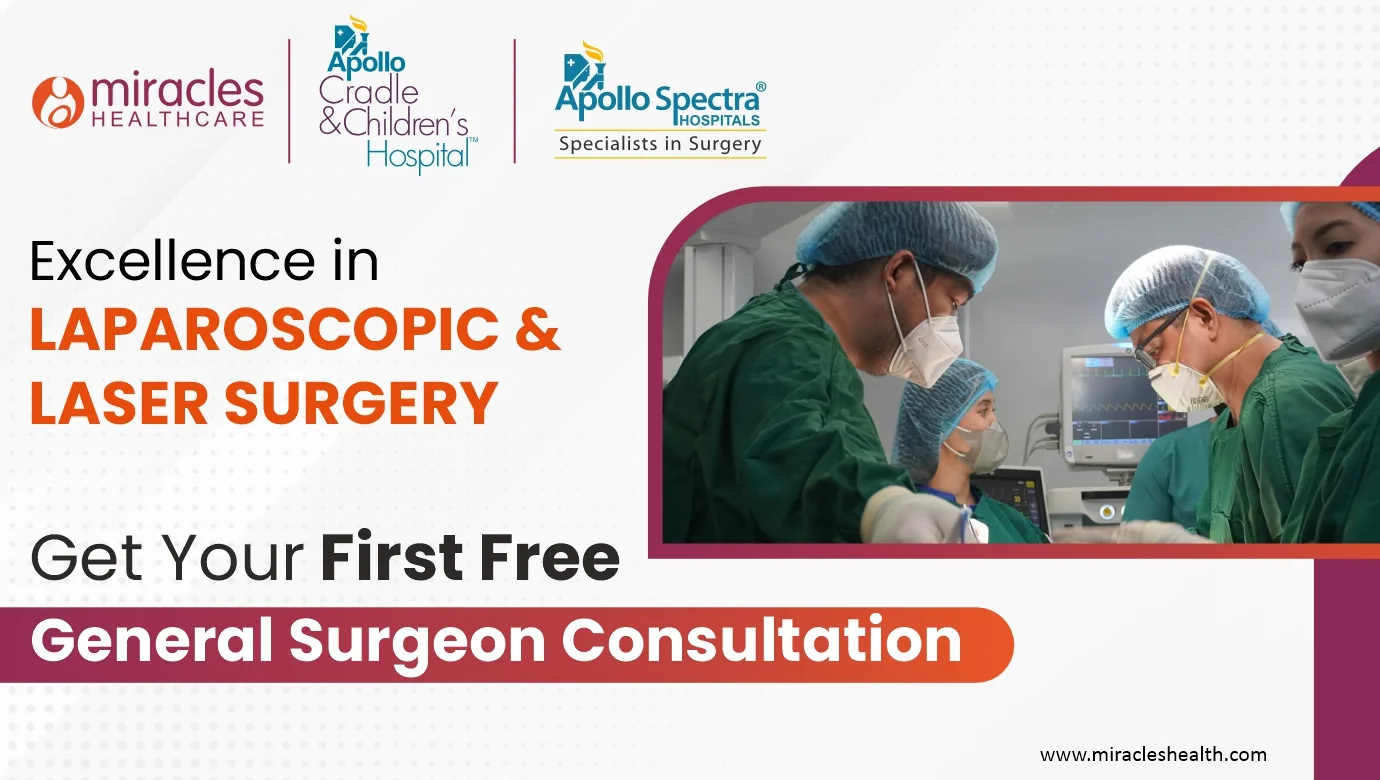General Surgery Conditions We Treat
Comprehensive Care for Your Health

Gallbladder removal (cholecystectomy) is performed to relieve symptoms caused by gallstones or gallbladder inflammation. It can be done laparoscopically or through open surgery, involving the removal of the gallbladder. Recovery is usually fast, with most patients able to resume normal activities within a few days to a week.
The gallbladder is a small pear-shaped organ under the liver. Its function is to store and thicken bile produced by the liver. Bile is released from the gallbladder into the small intestine to help in the digestion and absorption of fats
Gallbladder removal surgery is a medical procedure performed to remove the gallbladder, a small organ located under the liver. The surgery is typically recommended for individuals experiencing symptoms related to gallstones or gallbladder inflammation, such as abdominal pain, nausea, vomiting, and jaundice. During the procedure, the surgeon either makes several small incisions or uses a laparoscope to perform minimally invasive laparoscopic surgery or open surgery to access and remove the gallbladder.
Laparoscopic surgery results in shorter recovery times and less postoperative discomfort compared to open surgery. Once the gallbladder is removed, bile is still produced by the liver but flows directly into the small intestine rather than being stored in the gallbladder.
Here are the reasons why gallbladder removal surgery may be necessary:
Gallstones: Presence of gallstones in the gallbladder causing symptoms or complications.
Cholecystitis: Inflammation of the gallbladder due to gallstones or other causes.
Pancreatitis: Gallstones blocking the pancreatic duct leading to inflammation of the pancreas.
Cholangitis: Infection of the bile ducts due to gallstones obstructing the flow of bile.
Biliary Dyskinesia: Dysfunction of the gallbladder leading to chronic symptoms.
Gallbladder Polyps: Growth of abnormal tissue in the gallbladder, sometimes requiring removal.
Biliary Colic: Intense abdominal pain due to gallstones blocking the bile duct.
Complications: Prevention of recurrent complications like jaundice or infection due to gallstones.
The right candidates for gallbladder surgery are individuals who experience:
Recurrent or severe symptoms of gallstones such as abdominal pain, nausea, vomiting, and jaundice.
Acute or chronic inflammation of the gallbladder that does not respond to conservative treatments may require surgery.
Complications arising from gallstones, such as blockage of the bile ducts leading to pancreatitis or cholangitis, may need urgent gallbladder removal.
Recurrent episodes of gallstone-related symptoms despite medical management or dietary changes
At high risk of developing serious complications from gallstones, such as those with diabetes or a history of pancreatitis.
Individuals with diagnostic findings such as ultrasound or imaging scans showing gallstones or gallbladder inflammation.
Preparing for gallbladder removal operation involves several steps to ensure a smooth procedure and fast recovery:
Consultation with Gallbladder Specialist: Consult with a gallbladder specialist to discuss the procedure, check your medical history, and address any concerns you may have.
Medications: Medications: Inform the surgeon about medications, supplements, or herbal treatments you are taking. They may instruct you to stop specific medications, before surgery.
Diagnostic Tests: Your surgeon may order diagnostic tests such as blood tests, ultrasound, CT scan, or MRI to assess the condition of your gallbladder and its surrounding structures.
Fasting: You may be instructed to fast (avoid eating or drinking) for a certain period before surgery, typically starting at midnight the night before the procedure. This helps prevent complications during anesthesia.
Preoperative Instructions: Follow any preoperative instructions provided by your surgeon, which may include showering with a special antibacterial soap the night before or the morning of the surgery to reduce the risk of infection.
Dietary Guidelines: Your surgeon may provide dietary guidelines to follow before surgery. This may include avoiding fatty or heavy meals in the days leading up to the procedure.
Quit Smoking: If you smoke, consider quitting or reducing smoking before surgery, as smoking can increase the risk of complications and slow down the healing process.
Gallbladder removal surgery can be performed using two techniques: laparoscopic surgery and open surgery. The choice of surgical technique depends on factors such as the patient's medical history, the presence of complications, and the surgeon's preference and expertise.
1. Laparoscopic Gallbladder Surgery:
The gallbladder doctor makes several small incisions in the abdomen.
A laparoscope, a thin tube with a camera, is inserted through one of the incisions to view the surgical area. Surgical instruments are inserted through the other incisions.
The surgeon carefully detaches the gallbladder from the liver, bile ducts, and its surrounding tissues. Once separated, the gallbladder is removed through one of the small incisions.
Then all the incisions are closed with sutures or surgical staples.
2. Open Gallbladder Cholecystectomy:
The surgeon makes a single, larger incision in the upper abdomen.
This technique allows direct access to the gallbladder.
The surgeon carefully removes the gallbladder and may need to ligate or clip the bile duct and blood vessels connected to it.
After that, the incision is closed with sutures or surgical staples.
Gallbladder removal surgery offers several advantages for individuals suffering from gallstones or gallbladder-related issues:
Relief From Symptoms: Gallbladder removal surgery effectively relieves symptoms such as abdominal pain, nausea, vomiting, and jaundice caused by gallstones or gallbladder inflammation. By removing the source of these symptoms, patients experience significant relief and improved quality of life.
Prevention of Complications: Gallstones can lead to serious complications such as pancreatitis, cholangitis, or bile duct obstruction. It removes the gallbladder, preventing the recurrence of gallstones and reducing the risk of complications associated with them.
Minimal Invasive Techniques: Laparoscopic gallbladder removal surgery is a minimally invasive technique, resulting in less postoperative pain, shorter hospital stays, and quicker recovery times compared to traditional open surgery.
Low Risk of Long-Term Effects: Removing the gallbladder typically does not affect digestion or overall health in the long term. Bile continues to be produced by the liver and flows directly into the small intestine, allowing for normal digestion of fats and other nutrients.
Improved Quality of Life: After gallbladder removal surgery, many patients find that they can resume their normal activities without the limitations imposed by gallbladder- related symptoms. They can enjoy a diet free from restrictions on fatty foods and experience fewer episodes of discomfort or pain.
After cholecystectomy, patients can expect several things during the recovery period:
Pain and Discomfort: It is common to experience some pain and discomfort at the incision sites, as well as in the abdomen, shoulder, or back. Pain medications prescribed by the gallbladder doctor can help manage this discomfort.
Bowel Movements: Some patients may experience changes in bowel habits, such as looser stools or more frequent bowel movements, especially after consuming fatty foods.
Activity Restrictions: While most patients can resume their normal activities within a few days to a week, strenuous activities may need to be avoided for a few weeks to allow the body to heal properly.
Follow-up Appointments: Patients will typically have follow-up appointments with their surgeon to monitor their recovery progress, address any concerns or complications, and remove any sutures or staples.
Potential Complications: While uncommon, complications such as bleeding, infection, bile leakage, or injury to surrounding organs can occur after surgery. If you experience severe or worsening symptoms, it is important to consult your gallbladder doctor.
Return to Normal Activities: With proper rest and care, most patients can return to their normal activities within a few days to a week after surgery. However, individual recovery times may vary based on factors such as overall health and the surgical technique used.
After gallbladder removal surgery, it's important to take certain steps to promote healing and ensure a smooth recovery process. Here are some care tips:
Follow Postoperative Instructions: Adhere to the particular postoperative instructions provided by your surgeon, including guidelines regarding wound care, diet, activity level, and medication management.
Monitor Incision Sites: Keep monitoring the incision sites for any signs of infection, such as redness, swelling, warmth, or drainage. Follow your surgeon's instructions to keep the incision areas clean and dry.
Manage Pain: Take prescribed pain medications or over-the-counter pain relievers as directed by the surgeon to manage any discomfort or pain.
Rest: Take proper rest during the initial recovery period and avoid overexertion.
Dietary Changes: Initially, adhere to a low-in-fat diet and slowly reintroduce solid foods as tolerated. Avoid fatty or greasy foods, spicy foods, and large meals, to prevent digestive discomfort.
Stay Hydrated: Drink plenty of water to stay hydrated. Drinking water helps in digestion.
Avoid alcoholic and caffeinated beverages: Alcohol and caffeinated beverages can irritate the digestive system, so avoid consuming them.
Monitor Bowel Movements: Pay attention to your bowel movements and report any changes to your surgeon. Initially, you may experience constipation or diarrhea but should improve over time. Eating fiber-rich foods and staying hydrated can help control bowel movements.
Gradual Increase in Activity: Start with light physical activities such as walking and slowly increase your level of activities. Avoid heavy lifting or strenuous exercise until advised by your surgeon.
Follow-up Appointments: Attend all scheduled follow-up appointments with your surgeon to monitor your recovery progress, address any concerns, and remove any sutures or staples.
Watch for Complications: Be alert for signs of complications such as constant abdominal pain, fever, chills, vomiting, jaundice, or difficulty breathing. If experiencing constant symptoms, immediately contact your gallbladder specialist.
Risk factors associated with gallbladder removal surgery include:
Bleeding: There is a chance of bleeding during or after surgery, especially if you are suffering from medical conditions that affect blood clotting.
Infection: If proper sterile techniques are not followed during the procedure or in postoperative care, there is the possibility of infection at the surgical site or surrounding tissues.
Bile Duct Injury: There is a risk of damage to the bile ducts, which carry bile from the liver to the small intestine. This complication can occur during surgery and can lead to problems such as bile leakage, infection, or obstruction.
Organ Injury: In rare cases, nearby organs such as the liver, intestines, or blood vessels may be accidentally injured during surgery.
Blood Clots: There is a risk of developing blood clots in the legs after surgery due to obesity, immobility, or a history of blood clots.
Anesthesia Complications: Reactions to anesthesia or negative effects such as nausea, vomiting, or respiratory problems can occur during or after surgery.
Digestive Changes: Some patients may experience digestive changes such as diarrhea, bloating, or difficulty digesting fatty foods after gallbladder removal.
Long-term Effects: In rare cases, some patients may experience long-term complications such as bile reflux, where bile flows back into the stomach, or post- cholecystectomy syndrome, indicated by persistent abdominal pain or digestive problems.
It's essential for patients to discuss these risks with their surgeon before undergoing gallbladder removal surgery and to follow all preoperative and postoperative instructions to minimize the likelihood of complications.
Several factors can influence the cost of gallbladder removal surgery including:
Type of Surgery: The surgical technique used can impact the cost. Laparoscopic cholecystectomy tends to be less expensive than open surgery due to several factors.
Preoperative Testing: Before surgery, patients may undergo several diagnostic tests such as blood tests, and imaging scans. The cost of these tests can add to the overall expense of the procedure.
Hospital or Surgical Facility: The cost of the surgery can vary depending on the hospital or surgical facility where the surgery is performed. Every facility has different pricing structures and overhead costs.
Location: The cost of medical services can vary depending on the geographic location of the hospital or surgical facility. The cost of surgery is usually higher in urban areas and regions.
Surgeon's Fees: The surgeon's fees to perform the procedure may vary based on factors such as experience, and expertise.
Anesthesia Fees: The cost of Anesthesia may also vary depending on the type of anesthesia used and the duration of the procedure.
Postoperative Care: The cost of postoperative care, including hospital stays, medications, follow-up appointments, pot-operative testing, and any complications that may arise, can affect the total cost of the surgery.
Additional Procedures: If additional procedures or treatments are required during or after the gallbladder cholecystectomy, such as bile duct exploration or treatment of complications, these can increase the overall cost of the procedure.
Miracles Apollo Cradle/Spectra is the best hospital for gallbladder removal surgery in Gurgaon. Renowned for its state-of-the-art facilities and patient-centric approach, our hospital boasts a team of highly skilled surgeons specializing in gallbladder removal operations. Utilizing the latest techniques and equipment, our surgeons ensure optimal outcomes with minimal discomfort and faster recovery times. Our comprehensive preoperative evaluations and postoperative follow-up care guarantee that patients receive the highest standard of treatment and support at every stage of their journey. If you're seeking the best surgeon for gallbladder removal nearby, contact us to schedule an appointment with our expert general surgeon in Gurgaon for gallbladder removal cholecystectomy.


Comprehensive Care for Your Health
Meet our expert team of General Surgeon where compassionate care meets expertise.
Inspiring Journeys: True Patient Stories
Miracles Apollo Cradle is a leading Maternity Hospital Gurgaon. We strive to give the best care to our patients.






Your Health, Our Network: Comprehensive Care Across Every Facility.
Learn about the world class health care we provide
Expert Advice and Health Tips
Learn about the world class health care we provide
Yes, gallbladder removal is considered a major surgery, although laparoscopic techniques have made it less invasive compared to traditional open surgery.
Gallbladder removal surgery is primarily used to treat gallstones, inflammation of the gallbladder(cholecystitis), bile duct stones, etc.
The gallbladder removal surgery cost in Gurgaon can vary depending on factors such as the reputation of the hospital or surgical facility, surgical technique used, hospital fees, surgeon's fees, and additional services required. It is important to confirm the exact cost before undergoing surgery with your surgeon or at the hospital.
Recovery from gallbladder surgery generally takes a few days to a week for laparoscopic procedures, with full recovery within a few weeks.
Gallbladder removal surgery is generally safe, with low rates of complications. However, as with any surgery, there are risks such as bleeding, infection, and injury to surrounding organs.